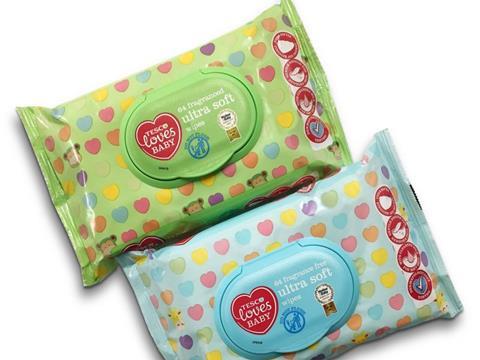
The UK-based flexible packaging manufacturer, Skymark, has developed a range of packs with significantly reduced weight for use in Tesco’s range of baby wipes.
Skymark developed a PE film to be used in a laminate structure which is lighter and thinner than previous designs used for Tesco’s own label Ultra Soft baby wipes. In total, this significant innovation has removed 57 tonnes of plastic from the waste stream in its first year.
Paul Glover, Commercial Technical Director, Skymark, said: “In line with the latest media coverage, its clear that consumers want to see more packaging on supermarket shelves that is both functional and sustainable. This small but significant change to baby wipes packaging represents a 20 per cent material reduction resulting in the removal of 57 tonnes of plastic.”
Through innovative design, use of the latest resin technologies and integrated film, print, lamination and conversion production capabilities, Skymark has down-gauged the PE film used in the laminate structure from 50um to 35um. The development results in a packaging weight reduction of 20 per cent, before the application of the lid.
Glover continued: “Our innovation team worked closely with the leading retailer’s packaging team and their chosen wet wipe supplier to design a pack which meets the needs of both the consumer and the retail supply chain. Our goal was to create a pack which was more sustainable and lighter weight, without sacrificing the aesthetics and performance of the pack in production. A focus on innovation and commitment to meeting customer expectations enabled us to turn that goal into a reality and create a pack that ticked all the boxes.”
The new pack structure brings a wealth of benefits to both manufacturing and the supply chain. The thinner film means there are more metres on any one roll, reducing the number of roll changes during pack production; as well as a reduction in the number of pallets being shipped, stored and moved. This all helps to further reduce the overall carbon footprint and environmental impact of the product.
Furthermore, the thinner film requires fewer raw materials therefore minimising packaging waste both at the point of manufacture and when the consumer disposes of the pack at the end of its service life.










